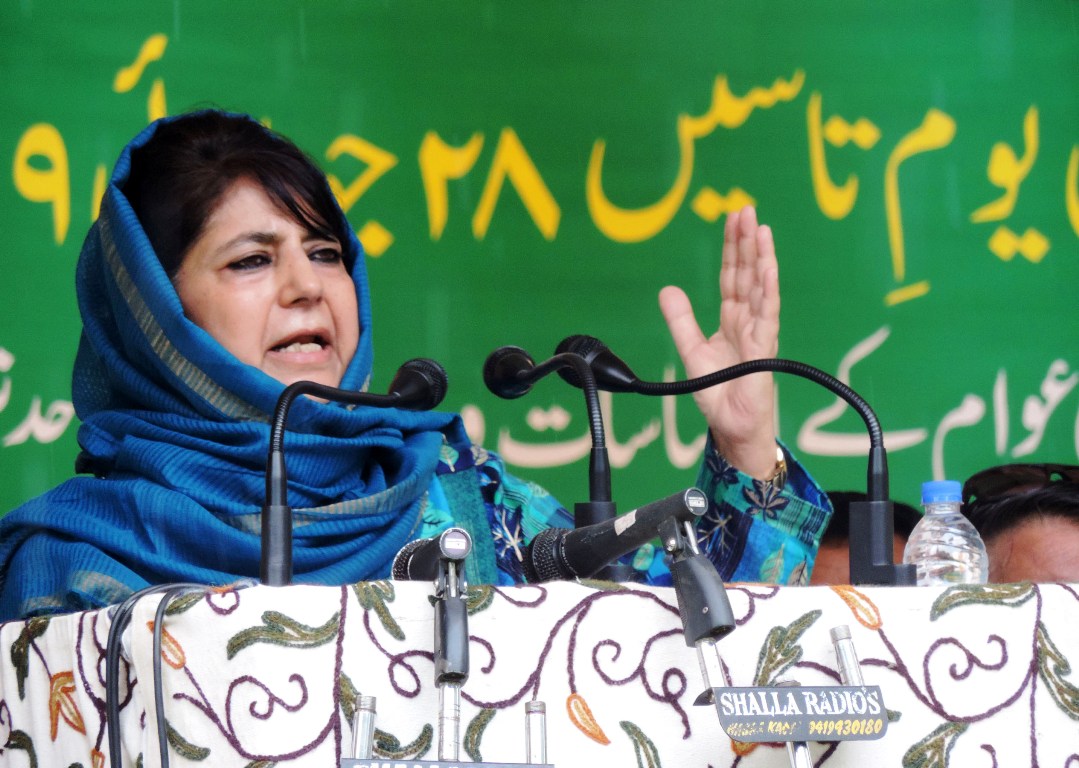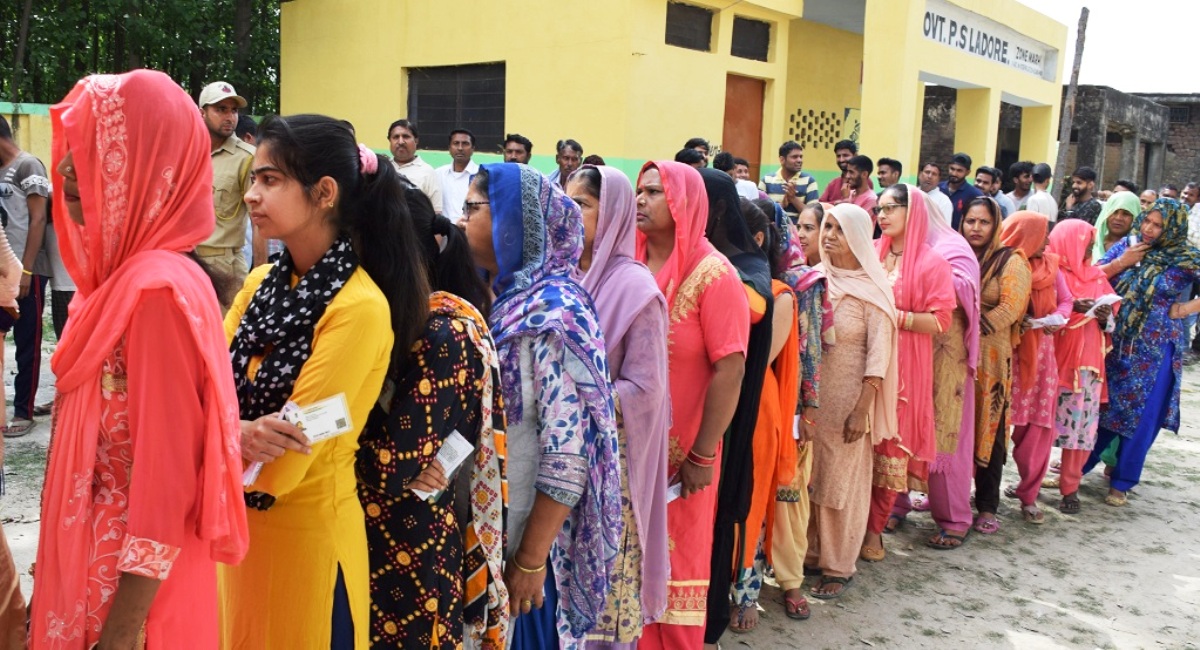by Syed Samreen
SRINAGAR: One fine morning when Sagar Suhail, 24, a tailor saw the residents in his Gulgam village in Kupwara, desperate for the masks, he put everything aside. He just got into stitching the masks for the panicked villagers.

Made of ordinary cloth, these were not the blue sterilized medical masks – for which the health workers across the world including New York are protesting on streets. But the quick availability reduced part of the panic the villagers were pushed into by the viral threat.
Sagar and Mother
“I know we all can contribute to the society one way or the other but I chose to do something which involved my skill of tailoring to help people,” Sagar said. “I don’t intend to sell my masks, rather give them to people for free.”
Sagar felt the need to manufacture masks at home after seeing the desperation of people around.
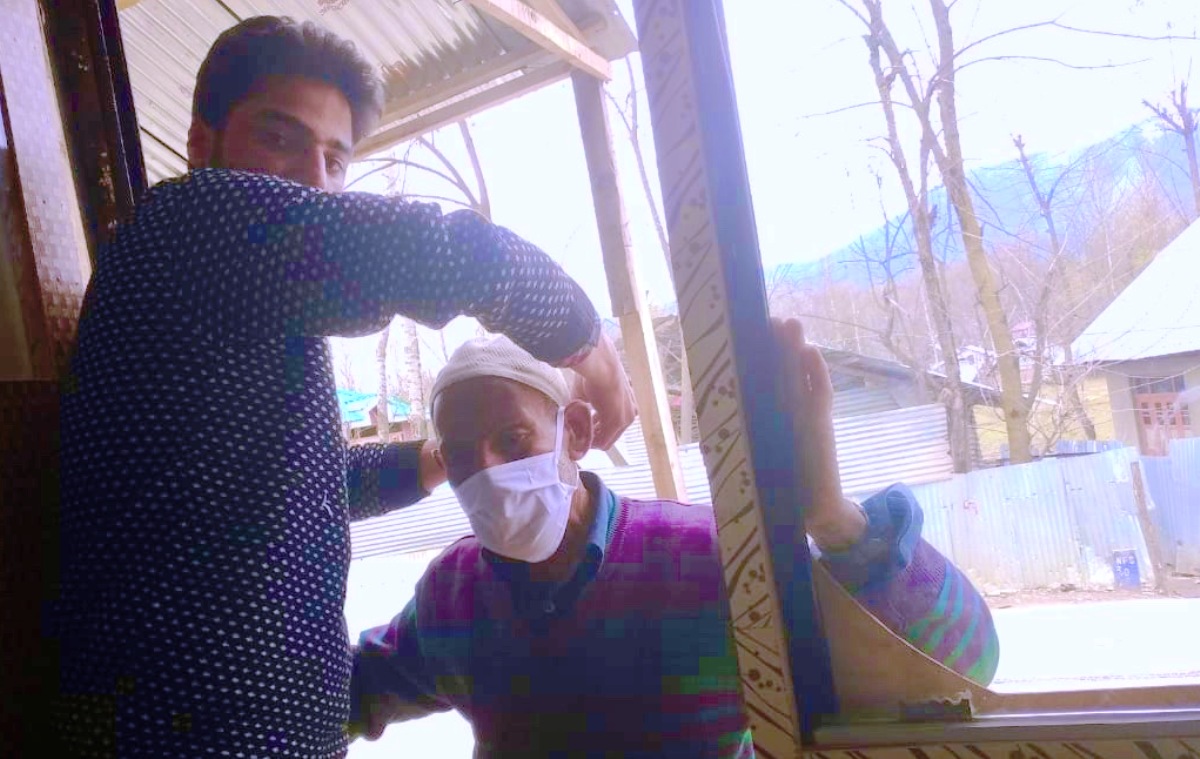
Aware that he wouldn’t be able to give masks to all the villagers, because he’s tailoring them alone, Sagar said he would be content even if a single-family would get benefitted from him.
On asking him about the material required to make the masks at home, he replied, “I need three meters of cloth to stitch sixty masks, and till now I have made 300.”
Typically, it takes Sagar one full day of concentration and hard work to make 60 masks. All the material required, from thread to the cloth is bought by Sagar from his own savings.
“There is one major reason that I am willing to help scores of people with my skill – my mother. She literally forces me on daily basis to stitch more masks,” Sagar said.
The market started exhibiting an appetite for masks at a time when the marriage season was about to begin. The season is usually profitable for tailors as people rush to get new sets of clothes stitched for the new season. In Sagar’s case, his mother, Sadiya Begum, 45, makes sure that her son takes out enough time from his tight schedule to help and contribute to society.
As things get tough, tougher get going. That is what Kashmir has seen in every crisis for a long time now. Every time, there is a crisis, the people join in. The only problem, this time, is that the requirement of social distancing is preventing the larger involvement. Despite that people are working, using social media to connect and reach more people.
Tarzoo Volunteers
In Sopore’s Tarzoo Village, a group of young men are busy telling people what to do and what not to do, as part of the outreach. They are Waseem Ahmad Mir, 25, Talib Shaheen, 17, Sami Ullah Bhat, 28, and Saddam Hussain Khan, 16, led by Aijaz Ahmad Malik, 33.
Recently, In a Facebook post by Saddam Hussain, 16, it was made known to the people of Tarzoo that they no longer worry due to the shortage of masks.
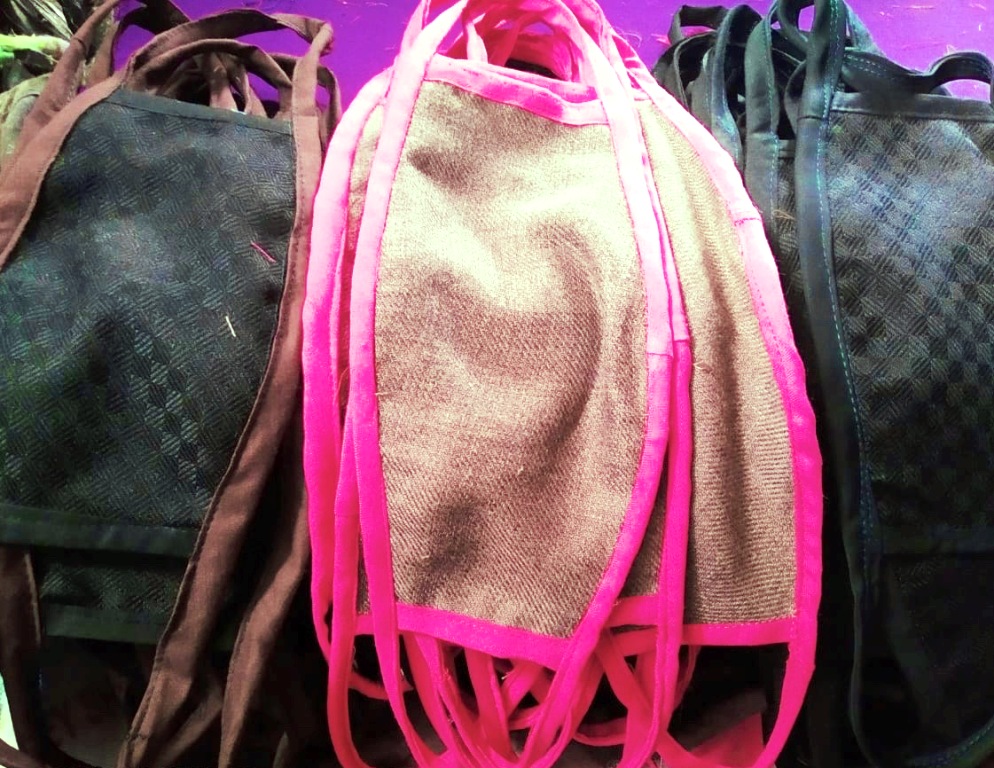
Hussain, who happens to be a part of the group, started receiving messages from people who were in need of masks. The group of compassionate friends started manufacturing masks at home. Not having the necessary skill and equipment to make the masks, they hired two tailors who belonged to the same locality.
“The two tailors, who we handed over our job to, also happen to be my cousins,” Aijaz said. “They worked extremely hard because this was the first time they were stitching something apart from the regular Salwar-Kameez.”
The amount that Aijaz paid to the two mask-makers was too small but was politely declined. “But we forced them to take a token of Rs 100 each,” Aijaz said.
Aijaz said mask making and distribution is the only thing, right now, they can do for the society while sitting at home.
Finally, after making 400 masks, when the time arrived to distribute the masks, Aijaz exercised social distancing and made the people stand three feet apart in the queue. “While giving away the masks, I made sure that I had put on gloves and a mask so that people wouldn’t doubt our efforts,” he said.
Along with the mask giveaway, what Aijaz also gave the people were lessons and ways to protect them from contracting the virus.
Mask making is something that everybody feeds the need of and everyone tries to contribute. Even kids do that now.
A Little Model
Aayat Tanveer, a ten year from Karan Nagar had vowed to make a hundred masks this week.
Aayat is a student of the International Islamic School and is studying in sixth grade. Interested in craftwork since the very beginning, Aayat thought of putting her skill to work at the time it was most needed.
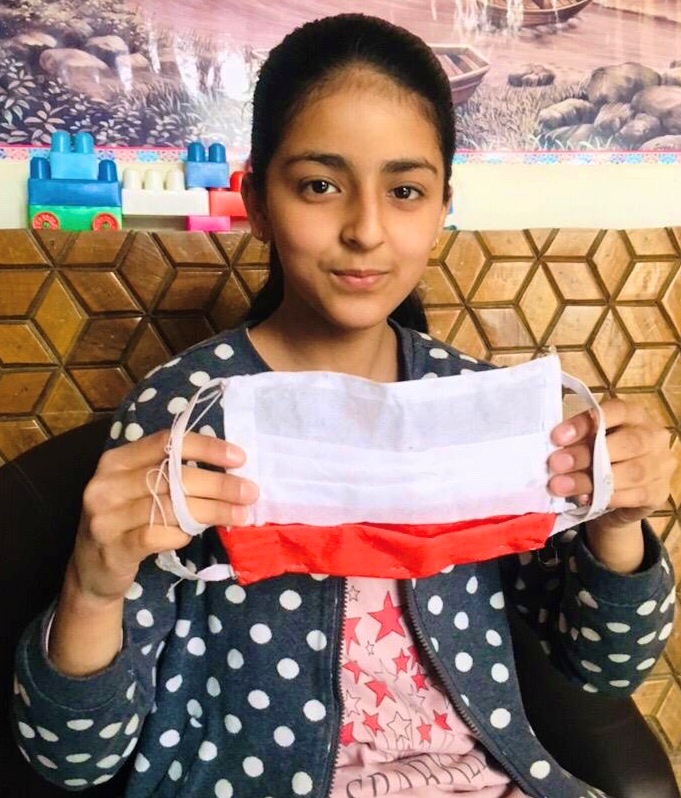
Tissue paper wrapped up in layers of cloth and fastened by elastic, Aayat thinks she can make up to a hundred such masks for people.
Aayat’s uncle, Ejaz Ayoub, Supports Aayat in her passion and calls it an ‘emotional project’ for her.
“The main Idea of this mask-making project and making her efforts public is that people start standing in unison at difficult times like these and help each other,” said Ejaz.
The material Aayat requires for her project includes cotton, jute bags, hot glue gun, elastic and tissue paper. The first seventy masks, said Ejaz, were easy to produce by her. Later on, Aayat made the masks at a slower pace, but more intricately.
Aayat inspired many people including her friends in the mask-making craft. She received many calls after her craftwork got publicized on social media. Being just a ten year old, she is well aware of the pandemic that has befallen mankind. She maintains that the masks she is making should be given to the people in dire need.
“Whenever the bin man comes to collect the trash, she makes sure that he has a mask on,” Ejaz said. “Also, on her directive, we provide ten to fifteen masks to everyone who walks in through the main gate be it the trash collector, the milkman, or for that matter any other relative.”
Basically, the first inspiration to people across the Valley in helping out people by making masks was Aayat, after her pictures with masks went viral on the Social media.
Fashion Designer Joins
Finally, the biggest ever production of masks came from a Fashion Designer from Rawalpora Srinagar, namely Mufti Sadia. Till now, over a whopping 2000 masks were manufactured by her tailors in the unit set up at her lodging.
While people were stressing and panicking due to the uncertainty that loomed large on them, Sadia went to the market to buy masks for her, staff and the family. To her surprise, she saw that the masks that were usually sold at a cheaper price were now sold off at Rs 90 each. The hike in price was definitely due to the rising demands of masks. This led her to finally start making the home-made masks.
Sadia Mufti prepares packets of facemasks to sell with a reasonable price in Srinagar.#COVID2019 #Covid19India #coronavirusindia pic.twitter.com/L5qW7SckiC
— Tauseef MUSTAFA (@TauseefMUSTAFA) March 29, 2020
Belonging to a Fashion Designing background, she found it doable to produce a large number of masks in a short span of time as she had the labour and the equipment. Owner of The Hangers, a city boutique, Sadia was preoccupied with kurtis or kaftans when the virus overtook everybody’s priority. She started with triple-layer masks and is now into the making of personal protective equipment (PPE) that medical staff requires.
In four to five days, Sadia got more than two thousand masks manufactured.
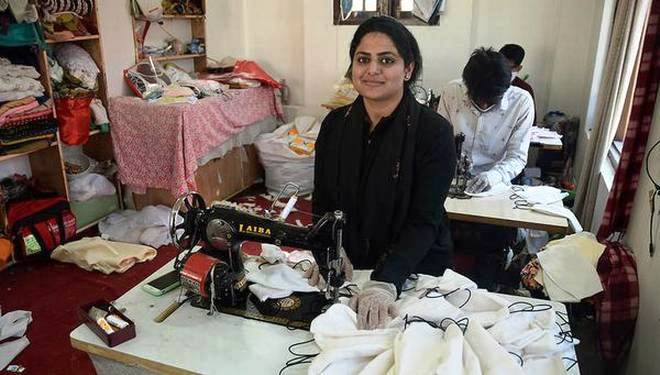
“I pay my tailors extremely less as compared to what they get on a regular basis,” Sadia told Kashmir Life. “I purchase the cloth and thread myself that is needed for the project and give away the masks.”
Sadia thought of increasing production and reaching out to more and more people in the coming days.
More Hands Join
Aware of the crisis that the health sector faces, a lot of women have joined hands. “Around 60% of the 270 skilled and semi-skilled professionals engaged by Ehsaas International, a non-governmental organization (NGO), are women,” The Hindu reported. “Besides 500 pieces of personal protective equipment, 3,000 triple-layered masks are supplied on a daily basis to the District Disaster Management Authority, Srinagar,” it quoted an NGO volunteer saying.
The newspaper reported that the Ehsaas International and J&K Skill Development Mission Society pooled manpower and trained certified professionals to develop health safety gears from a locally procured non-woven polypropylene material. “With their help, we have started making face shields, a substitute for goggles used as a part of personal protective equipment kit,” said Hakim Mohammad Ilyas, an Ehsaas International executive told the newspaper.




